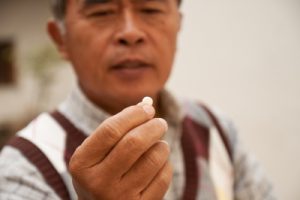
The hepatitis delta virus is a sub-virus of hepatitis B that depends on the hepatitis B virus to survive and reproduce. Hepatitis delta affects between 5% and 10% of people living with hepatitis B, and can quickly progress to a more serious and advanced liver disease than HBV alone. Since 2016, the Hepatitis B Foundation has coordinated a program called Hepatitis Delta Connect, which works to raise awareness of hepatitis delta; promote screening, research, and management of the virus; and provide support to individuals living with and affected by the disease. This includes capturing the lived experiences of hep D. This month, Ariana, an intern at the Hepatitis B Foundation, interviewed Nargis, a resident of New York, who is living with hep B and hep D, about her experiences of the viruses, from diagnosis to management. We thank Nargis for sharing her story!
Ariana: Thank you very much for joining today! When were you initially diagnosed with hepatitis delta?
Nargis: I was diagnosed in 2005. I did my blood work at the end of 2005 and got my result at the beginning of 2006. The reason why I went to do the blood work is because I had very severe flu-like symptoms.
Ariana: How did you find out you were living with hepatitis delta?
Nargis: I was out of the city for a trip, and felt sick after, so I immediately returned to the city and did blood work and found that it’s hepatitis D. I was surprised because I know if you don’t have hepatitis B, hepatitis D would never exist in your body.
Ariana: How did you initially feel about it?
Nargis: To be honest, I was depressed. It happened during the best time of my life when my career was at a high point, and I’m feeling like I’m enjoying life and everything is fine. All the difficulties in my life were gone. During that time, I was at the top of the level of my career and I could do something for myself and for my family. And I had big plans, and when I was diagnosed with hepatitis B, all my plans just collapsed. My doctor just straight up told me that I’m lucky to have Hepatitis B and D, not C. They did not give me any kind of psychological support, and I was extremely depressed. Thank God for my family and my husband for being there to support me always.
I’m originally from Dushanbe, Tajikistan. It’s a small country in central Asia. Unfortunately we don’t have enough good medicine to help with this kind of thing, as the government is not supporting nor providing any kind of medication. The medication I needed had to be ordered from Russia to bring here, and was very expensive. The prices go up and down. And, this one is also not guaranteed to work. I got interferon, but it didn’t work for me. After one month of injections, I got very, very sick. And the doctor decided to stop it.
Ariana: How do you think this disease has impacted your physical state?
Nargis: Mostly it’s the mental changes when you are becoming depressed, but when you’re starting the treatment, you feel so weak. I had severe weakness, fatigue. I also had GI (gastrointestinal) problems as well.
You get kind of the nausea, no vomiting, just the nauseous feeling. But in the morning, you are feeling fatigued. You are always the one to sleep and have joint pain. Now I’m just feeling kind of the joint pain, but when I’m starting to work or do some activity, I get tired. I always feel the fatigue, you know, or the fatigue sometimes is so much, I don’t want to even do anything, but I always push to do things I should do. I often get bad pain.
But I’m always appreciative, you know, as I am still alive, and I have to thank my family for that.
Thank God. My third daughter was checked for hepatitis B and D too. Thank God, she got her vaccination, which is making us happy. Now I have four kids, and I’m calling my fourth child my miracle child, she gives me so much happiness.
And all of them, all my kids are free from hepatitis B. They got all the vaccinations, my husband as well. And routine family life and my job are like keeping me in the life, making me happy, and I’m not thinking so much about my hepatitis. Thank God, I have my arms, my legs and I can eat, I can walk, I can see. This is more than enough to keep me happy.
Ariana: Why is raising awareness of hepatitis delta important?
Nargis: It’s important for people to know about it and I’m talking about my experience. I didn’t catch it from receiving medical care in my country, but a lot of people don’t know about this one and, if you don’t know, you don’t pay attention. We must be careful with needles [which can possibly transmit hepatitis delta].
It is important to make information booklets, allowing patients to talk about their experiences, finding people similar to us, and we are people, we still have this disease, but we are very active, we can work, we can sing, do something good.
It is better if you support each other as well, every person is important in this life, every person can be very important for somebody else.
People must know. If you’re somebody who doesn’t have education, maybe there’s some pictures with a simple explanation to tell them. It really works because, when HIV and AIDS existed in this world last century, the people didn’t know so much about it. And when the other foundations and the people and mass media started to get to work and explain, and gave out the information booklet, people are starting to pay attention now. And I’m thinking this can work for hepatitis as well.
Ariana: What do you wish more people knew about this disease?
Nargis: It’s hard to always be healthy. I wish for everybody to be healthy, but it’s now hard to be healthy, because you never know where you can catch hepatitis…And just so I can wish for people to keep their eyes open and not be afraid.
Keep your eyes open. Where are you going? What are you eating? Which kind of medical offices are you going to? If you have the blood transfusion, using the needles or something, or some kind of tools used for dental procedures, just to make sure all of them, they’re sterilized and clean.
Be open mentally and healthy. It will help you in this kind of situation as well. You know, talk with somebody if you can talk with some of your family members or with people from outside. I’m an open person, and for me, it’s very, very helpful.
Also, Dr. Kushner invites me to Zoom classes where I hear about the Hepatitis B Foundation, the kind of research you have, what the people around the world are trying to do and how to help patients. It’s given me support. It’s given me kind of the hope that not everything is lost and I believe that some medication will be invented soon in the world to help the millions of people with hepatitis B and D.
Ariana: What resources do you think you would have wanted initially when you got diagnosed with hepatitis delta?
Nargis: Getting the right medication for people is very important. Insurance companies should help the patient to get the right medication. And also, I’ve been in a research study and the first research study I got is a medication for hepatitis B and D. The doctor teams are working specifically with this kind of patient when the patient goes to the hospital and does the blood work to see the level of the hepatitis B and D and also the liver enzymes.
Also patients are depressed and always need some support group, maybe some social workers can closely work with people who have hepatitis B and D.
Ariana: Do you think there’s anything else you would like to share about your experience?
Nargis: I would like to tell the people who have hepatitis B and D, do not be afraid. The doctors are working, and the research team is working hard. We’re not alone in this world. The Hepatitis B Foundation and many others are working on this problem. Do not lose hope. Be powerful, be happy, thank God we are alive, and support each other.
Ariana: Awesome. Thank you so much for sharing your insight and experiences with us today!








